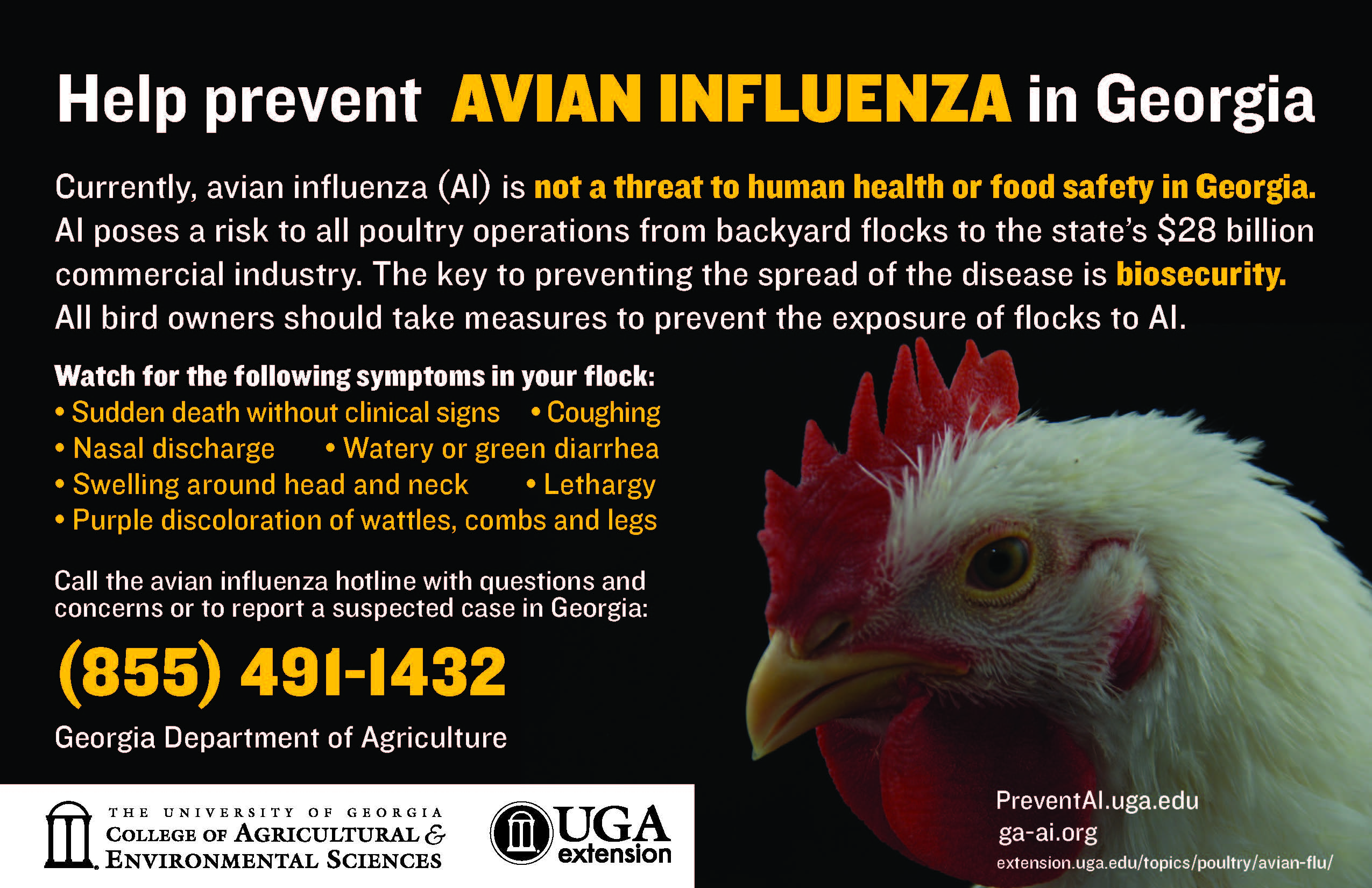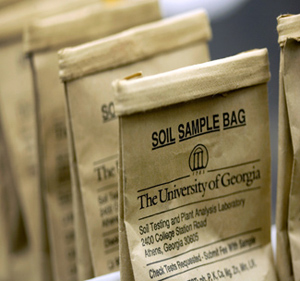Agriculture & Natural Resources
ANR Staff
The University of Georgia College of Agricultural and Environmental Sciences help Georgians become healthier, more productive, financially independent and environmentally responsible.
Select a Category:

Diagnostic Services:
Soil Testing
Soil Testing will help you develop and maintain a more productive garden by providing information about the fertility status of your soil.
Information from a soil test will help you select the proper liming and fertilization program to obtain the optimum growth of lawn, garden, ornamental and agronomic plants. With the growing prices of fertilizer and soil amendments, a soil test is a relatively cheap option that could potentially save you a lot of money.
Routine Soil Test.................................$10.00 per sample (includes postage):
Includes pH, Lime Requirement, Phosphorus, Potassium, Calcium, Magnesium, Zinc, and Manganese. At least a pint of soil is needed per soil sample to be tested. The lab cannot process samples that are less than a pint. Be sure to pull the soil sample from several spots at random to get a good representative sample. You may bring samples in a pint size plastic freezer bag (filled full) if you don't have a soil sample bag. Please follow the procedures for collecting soil samples below.
- Soil Test Frequently Asked Questions
- Soil Sampling Procedures in Home Lawns, Gardens & Food Plots
- Soil Sampling for Farms and Pastures
- Direct Mail Soil Test Kits
- Interpreting a Soil Analysis
Specialty tests for pesticides, minerals, pH and petroleum products can also be performed. Costs for these tests are dependent upon which test is selected.
Water Testing
Your water should be safe to drink and acceptable for all other household uses. In addition to illness, a variety of less serious problems such as taste, color, odor and staining of clothes or fixtures are symptoms of water quality problems.
- Testing for Water Quality
- Water Test Frequently Asked Questions
- List of Available Tests with Pricing
Routine tests for household wells, lead, nitrates, pesticides, minerals, pH and petroleum products are among the many tests that can be performed. Costs are dependent upon which test is selected.
Forage Testing
- Feed and Forage Sampling Procedures (Submit samples in 1 gallon Ziploc bags)
- Understanding and Improving Forage Quality
- Using Relative Forage Quality (RFQ) to Categorize Hay
- Forage Nitrate Toxicity
Nematode Testing
Nematodes cause roots to become knotted and galled and impair the root system so that water and nutrients cannot be taken up. Nematode damaged plants become stunted, turn yellow and wilt in hot weather.
The best time to determine if you have a nematode problem is in the summer and fall, when nematodes are most numerous.
Avian Influenza

Avian Influenza or AI is a highly contagious viral disease of birds. It is carried by wild aquatic birds, especially waterfowl which are not greatly affected by the virus. There are AI viruses of low pathogenicity to poultry (LPAI) that cause mild disease and others that are highly pathogenic (HPAI) that cause severe symptoms, including death. Under some circumstances, a LPAI virus can mutate to become HPAI. Avian influenza in any of its forms is a serious threat to the poultry industry. It can make domesticated birds such as chickens and turkeys very sick and may lead to high mortality.
- How to protect against avian influenza
- Preparations & Precautions
- Quick Guide to Signs of Highly Pathogenic Avian Influenza
- Avian Influenze Decision Guide for Small Flocks - Instructions
- What Happens if Highly Pathogenic Avian Influenza Hits Poultry in Your County
Pesticide Applicator Licensing
- UGA Pesticide Safety Education Program
- Georgia Private Pesticide Applicator Testing ($25 fee began May 1, 2017)
- Georgia Commercial Pesticide Applicator Testing ($45 testing fee and $90 license fee)
- Online Training Courses for Commercial Pesticide Test preparation ($45 for all three courses)
- Recertification Courses offering Pesticide License CEU's
- Check your license expiration and hours earned

Insect Identification
Proper diagnosis is necessary to achieve good pest management. It's important to remember that only a small percentage of insects on plants are pests.
- Insect Identification Reference
- Common Pests in Landscapes
- Homeowner Insect Diagnostic Form
- Commercial Insect Diagnostic Form
Plant Identification and Plant Disease Identification
Plant identification is critical for Integrated Pest Management (IPM) and the proper use of pesticides in agriculture and horticulture situations. It is also helpful to the clientele that just want information on that weed, flower, shrub or tree growing in their landscape.
- Weed Identification Reference
- Aquatic Weed Identification Reference
- Invasive Plant Identification Reference
- Native Plant Identification Reference
- Poisonous Plants of the Southeastern U.S. Reference
Disease organisms such as fungi, bacteria, and viruses can damage and/ or kill a wide variety of plant materials in Georgia. It is essential to identify the organism accurately before implementing control strategies.
Tips for Submitting Plant Specimens
When possible, collect a generous sample of the plant's stem with leaves still attached. Try to include any flowers, fruits, cones or buds of the plant.
Deliver the specimen fresh to the county Extension Office. Plant samples may not be identifiable if they have been crushed, decayed or dried and shriveled.
To assist in obtaining a rapid, accurate identification of plant specimens, be sure to bring the following information:
- Description of site where plant was collected. (Sun/shade, natural area/landscape, wet/dry area etc.)
- Your name and address
- Date it was collected
- Description of plant (size, shape, description of flowers, etc.)
- Stage of growth: seedling, blooming, fruiting
- Photos are also helpful.
Wildlife Identification
It takes 7-10 business days from the time the lab receives the sample for results to be made available. PLEASE NOTE - During the holiday season there are times when the lab is closed resulting in longer than usual turnaround for results.

